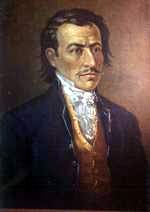Eugenio Espejo
Eugenio Francisco Xavier de la Santa Cruz y Espejo (baptized February 21, 1747 in Quito , † December 27, 1795 in Quito) was a writer , doctor , lawyer and thought leader of independence during the Spanish colonial rule in later Ecuador . He is considered one of the most important enlightened thinkers in Latin America in the late 18th century and adapted these ideas, which came from Europe, to the social conditions of his environment.
Life
Espejo was the son of an indigenous man and a mulatto woman . His father was originally called Luis Chusig and came from Cajamarca . He came to Quito with a Bethlehemite priest who was director of the Quiten Hospice of Mercy. Chusig, who changed his name to Santa Cruz y Espejo, worked there as a nurse, administrator and surgeon. His son Eugenio worked as his helper and assistant from an early age. He also attended classes given by Dominican priests to poor children and was later taught by Jesuits . In 1762 he graduated with honors in philosophy. In 1765 he began studying medicine at the Universidad San Fernando of the Jesuits, where he obtained his doctorate as a doctor in 1767 and shortly thereafter also acquired a doctorate in secular and canon law. He was an avid reader and took in the latest ideas from the fields of philosophy and politics. As a mestizo , it was not easy for him to make his way in the classic colonial society of his time. It was not until 1772 that he was licensed as a practicing doctor during a smallpox epidemic.
Despite the opposition in Quito society, he became one of the key figures in cultural life, especially in the spread of progressive ideas, with the support of a sizable section of the Criollo nobility. In 1779 he published his first important work, El Nuevo Luciano de Quito (German: The New Bringer of Light for Quito ), an impressive and clear criticism of all the problems and deficiencies of cultural life in the Real Audiencia de Quito , which he wrote in two further works, Marco Porcio Catón (via Cato the Censor ) and La Ciencia Blancardina (among others against practicing doctors without academic degrees). In 1785, at the request of the authorities of Quito, he wrote the important practical medical work Reflexiones acerca de un método para preservar a los pueblos de las viruelas ( Reflections on a method to save peoples from smallpox , 1785). On the one hand, this testifies to Espejo's medical competence and, on the other hand, is an important tradition on the hygienic conditions in Quito at the time, which gave rise to clear criticism of Espejo's official bodies and their handling of the epidemic.
His critical-cultural activities called the state against him on the plan, so that in 1786 he fled to Riobamba , where the local priests protected him and Espejo defended himself offensively against the allegations. He was exiled to Bogotá , the capital of the viceroyalty of New Granada, where a trial began against him that added to his reputation.
After his return to Quito, from 1789 he was initially unable to hold any offices for two years, but was still allowed to write. In 1791 he was appointed first director of the new public library, which was formed from more than 40,000 volumes by the Jesuits that had recently been expelled from the Spanish possessions. In November 1791 he played a leading role in founding the Sociedad Patriótica de Amigos del País de Quito (German Patriotic Society of Friends of the Country of Quito ). Similar associations began to emerge in Spain and the colonies during this period. In 1792 he published Quito's first newspaper, the Primicias de la Cultura de Quito , of which only seven issues appeared. He was re-imprisoned for his persistent charges against the prevailing conditions. He died in Quito State Prison in 1795 at the age of 48.
Reception and effect
Espejo's thinking combines the ideas of the Enlightenment with the social and cultural reality of colonial Quito. He was one of the first to make clear the need for emancipation from Spain and to proclaim the independence of his country and all of America. His plans included the formation of independent sovereign republics in which all citizens should have the same rights. The church property should be secularized or nationalized. In his thinking, the ideal of equality between indigenous people , mestizos and European colonialists emerges clearly (an ideal that was not implemented in the later process that led to Ecuador's independence), as does the preoccupation with women's rights. His ideas formed the basis for Ecuador's first declaration of independence on August 10, 1809 , albeit significantly changed in important aspects .
Works
- Reflexiones acerca de un método para preservar a los pueblos de las viruelas (1785), full text online (413 pp., Spanish) available at http://www.conmemoracionescivicas.gov.ec/obras/reflexionesespejo.pdf
- Voto de un Ministro Togado de la Audiencia de Quito (1792), full text online (149 p., Spanish) available at http://www.conmemoracionescivicas.gov.ec/obras/vototogado.pdf
Web links
- Rodolfo Pérez Pimentel: Eugenio Espejo , In: Diccionario Biográfico del Ecuador , Guayaquil 1987–, Volume 3, pp. 103ff. (Spanish)
| personal data | |
|---|---|
| SURNAME | Espejo, Eugenio |
| ALTERNATIVE NAMES | de la Santa Cruz y Espejo, Eugenio Francisco Xavier (full name) |
| BRIEF DESCRIPTION | Writer, doctor, lawyer and thought leader of the independence of Ecuador and Latin America |
| DATE OF BIRTH | baptized February 21, 1747 |
| PLACE OF BIRTH | Quito , Ecuador |
| DATE OF DEATH | December 27, 1795 |
| Place of death | Quito , Ecuador |
